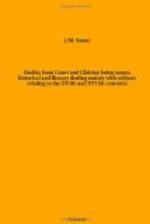* Orig. G. Epist., 9, 133.
On the 31st January 1570, the same Father wrote from Innsbruck:—
“The college at Hall is going on quietly. The queen scarcely worries us at all; she has not yet entered our house since we went there, and she seldom sends for us. In short, she leaves us in peace, and if this continues, no one can complain of her, except that she generally detains her confessor for nearly two hours after Mass. But this can be borne, as there is no danger, and as I have often called her attention to it and have blamed her for it, she is now rather more considerate.”
The following extracts from “Queen” Magdalen’s statutebook for her community show somewhat amusingly that the continual exhortations of the superiors of the Society had made some impression:—
“Jesuits are to be chosen as confessors. Out of confession none must speak with her confessor without the permission of her superioress, who shall not give leave unless there be sufficient reason for it. For although one may have a scruple or a temptation, this can be deferred to the next confession. An exception must be made for the superioress herself, for it is needful that she speak often with him, but not always necessary for her to take him up to the house; sometimes she can confer with him in the lodge or in the lower corridor. They must not make acquaintance with any other of the Fathers, or invite them to the house, neither must they send food to any sick Father, except in cases of great need, and only for a short time, say for a week, but not longer. Neither must they give them money daily to buy milk, butter, and such like things, but now and again, if necessary, they may give them the wherewithal to procure cheese and lard.”
Notwithstanding these regulations, none must suppose that the archduchess is devoid of confidence or regard for the Fathers or for priests in general. All her life she has “loved them in God, and will continue to do so to the end; but there are many things good in themselves, and agreeable to God, which must nevertheless be avoided for the sake of a better thing still.” If her spiritual daughters are careful to avoid exaggeration, and observe her precepts faithfully, they will find the Society better disposed towards them, will help them to save their souls, and will be less likely to change their confessors.
But in spite of her naivete, and of the excellent advice she gave to others, there were, for several years, innumerable difficulties with regard to the Archduchess Magdalen’s confessor, Father Hezcovaus. He was infirm in health, and needed much waiting upon, day and night. Moreover, he observed the rule as little as possible, and his august penitent unwisely took his part against his superior far more than was desirable. It was at last decided that he should be dispensed altogether from keeping the rule, that he need only obey the General, and his confessor, and that he might receive from the Archduchess Magdalen all that he needed for his support. But even this was not enough, and sometimes it was debated whether Father Hezcovaus should still be included in the list of those belonging to the college.




